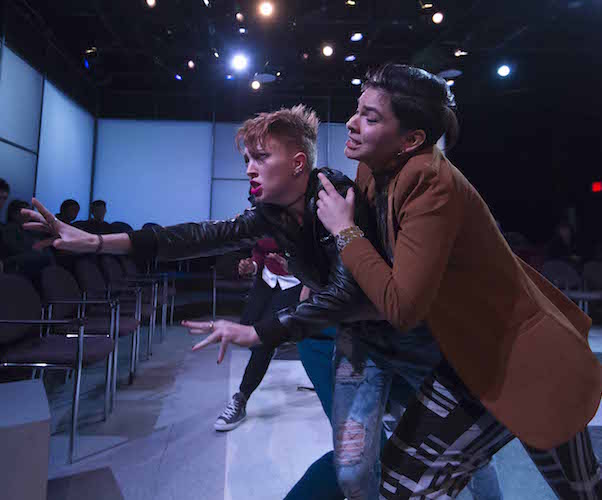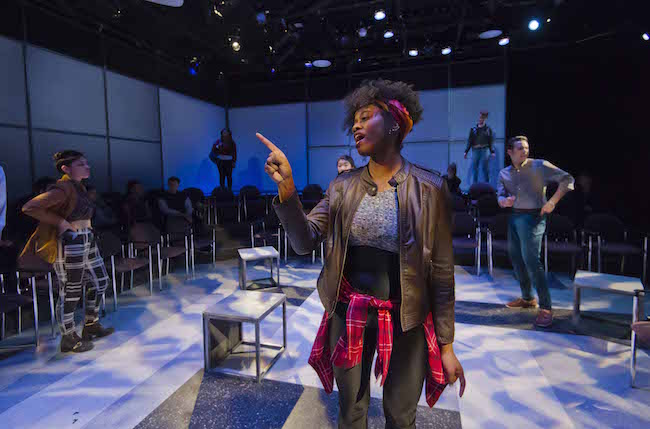Theater Review: “Baltimore” — Talking Isn’t Enough
There’s nothing wrong with preaching the value of empathy — but who would argue?
Baltimore by Kirsten Greenidge. Directed by Elaine Vaan Hogue. Presented by the Boston Center for American Performance and New Repertory Theatre at the Boston University Theatre Lane-Conley Studio 210, 264 Huntington Avenue, Boston, MA, through February 28.

Lexi Jenne and Linda Vanesa Perla Giron-Blanco in the BCAP and New Rep staging of “Baltimore.” Photo: Kalman Zabarsky.
By Bill Marx
There is much to admire in the Boston Center for American Performance and New Repertory Theatre presentation of Baltimore. First off, Kirsten Greenidge’s script is the second production (the first was Good Kids, penned by Naomi Iizuka) to come out of the admirable Big Ten Theatre Consortium, which has the charge of commissioning plays by “outstanding American female playwrights”:
Each play features at least six age-appropriate roles for young women. Men may also be included in the casts. The purpose of the initiative is to promote the writing and production of new works about women by professional and academic theatres around the country. It is also meant to draw attention to the need to produce and support such plays.
Amen to that. And there is no denying the admirable talent of Greenidge and the admirable relevance of a play that probes the unfortunate belief, articulated on some university campuses, that we have now reached a state of post-racial nirvana, a stance that conveniently lets students feel free to follow society’s primal directive: don’t make waves if you want to get ahead. And cheers of admiration to the Boston Center for American Performance and New Repertory Theatre for making Boston University one of the stops for this “rolling world premiere,” which includes productions at Michigan State University, the University of Maryland, and Ohio State University.
As you can sense, there are inevitable down sides when you are hoisted, with so much authorized determination, into the heights of the admirable. With good intentions comes earnestness, and Baltimore, for all its linguistic vibrance and concern about repressed racial tensions, sacrifices dramatic and political edge on the altar of agreeable lesson-mongering. In addition, it is afflicted with an irritating condition that I call “storyville”: many contemporary playwrights think (or are being taught) that theater is about hearing characters tell their stories. These scripts shy away from revelatory conflict; they aren’t interested in digging deeper into the inner or outer lives of characters and their dilemmas. The idea is to give various perspectives an airing: characters confess rather than confront each other over thorny issues of justice and judgment.
A ‘hot button’ set-up in Baltimore is used to drive a series of confessions or monologues. Shelby (Desiré Hinkson), an advisor to a cadre of freshmen at a large university, is faced with a difficult crisis that leaves her in a state of hysterical paralysis. A white student, Fiona (Lexi Jenne), who is romancing Bryant (Seth Hill), a black student, pins an offensively racist cartoon on the door of Alyssa (Alice Kabia), a black female student. Fiona insists it was nothing but a joke (people should toughen up), but others, particularly African-American Leigh (Jade’ Davis) and Latina Rachel (Linda Vanesa Perla Giron-Blanco), explode with righteous indignation, inflaming others to take sides, firing off barbs at the school and other students. Shelby, mired in Hamlet-like indecision, refuses to answer her charges’ calls for help, even when her Korean friend Grace Kim (Ami Park) begs her to bring about some sort of meaningful dialogue.

Jade’ Davis and cast in the BCAP and New Rep staging of “Baltimore.” Photo: Kalman Zabarsky.
While Shelby dithers, her reluctance rooted in a post-racial prejudice not to want to deal with the mess, the students talk and talk and talk and talk. Some of the stories chronicling prejudice are moving, some of them sound like high school tantrums, others might have been lifted out of a New York Times op-ed piece. Greenidge is too smart of a playwright not to make use of humor, but sometimes it feels as if we are being fed a laundry list of grievances, a barrage of representative ‘attitudes’ that don’t rise far above the superficial. (The dramatist also takes the easy way out by making Fiona a somewhat convenient villainess.) We don’t hear from the victim, Alyssa, until fairly late in the play. When the character finally appears she emits a compelling note of hurt and anger, and it is welcome amid all the gum-flapping. Then she is lost in the gaseous shuffle.
What is the solution to the turmoil? Greenidge has selected characters tell us over and over and over again: we need to really see and hear others. There’s nothing wrong with empathy, with being curious about the lives of others, but who would argue? And why does it take so long for Shelby to see the obvious and take a leadership role? After all, she has a wise African-American Dean (Cliff Odie), a veteran of the Civil Rights movement, and her friend Grace giving her the liberal low down. And while Greenidge is savvy about how social media whips up scandal at super speed, she ignores the fact that a university administration would swoop down on this sticky situation in a nano-second (reporters, donors, and alumni read tweets and Facebook). Incidents of racial conflict on campus are very bad for branding and the bottom line. It might have been interesting to have a pragmatic figure from the administration — hell-bent on air-brushing the fracas away as quickly as possible — try to elbow Shelby aside.
The irony is that, for all of its real merits, Greenidge’s solution, let’s sit down and talk about our differences, misunderstandings, and prejudices, doesn’t take up the insidious ways the broader social picture shapes the conversations we have. Sticking to issues of personal responsibility safely reassures audiences — dramatizing the impact of systemic racism, media stereotyping, political corruption, and economic inequality risks provocation. We need more of the latter in today’s theater.
The BCAP and New Repertory Theatre production moves with brisk efficiency, the young cast members providing plenty of galvanic energy and street-wise passion. Sometimes the performers are keyed up — less can be more — but generally they present convincing facsimilities of today’s articulate students. And, when given a powerful point to make, the actors drive it home quite nicely — Park hits the mark with a moving rendition of a story about going home to Korea and dealing with the assertive expectations of relatives. A screen (on two sides of the theater) slowly reveals the offending cartoon: the final image is a bit too cute for my taste. And perhaps it is because, like the aging Dean, I am a relic of the ’60s, but I was puzzled that when the youth were about to settle down to a serous confab the academic is made to walk off into what looks like the historical sunset (he makes a very conspicuous exit from the set). Greenidge goes out of her way to make the valuable point that Shelby and her generation, addicted to screens and texting, need to learn American history and do the hard work of studying the past and appreciating its complex lessons. Surely the oldsters have something to contribute to that process, if only to say that talking isn’t enough — you have to hit the books.
Bill Marx is the editor-in-chief of The Arts Fuse. For over three decades, he has written about arts and culture for print, broadcast, and online. He has regularly reviewed theater for National Public Radio Station WBUR and The Boston Globe. He created and edited WBUR Online Arts, a cultural webzine that in 2004 won an Online Journalism Award for Specialty Journalism. In 2007 he created The Arts Fuse, an online magazine dedicated to covering arts and culture in Boston and throughout New England.
Tagged: Baltimore, Big Ten Theatre Consortium, Boston Center for American Performance, Kirsten Greenidge

